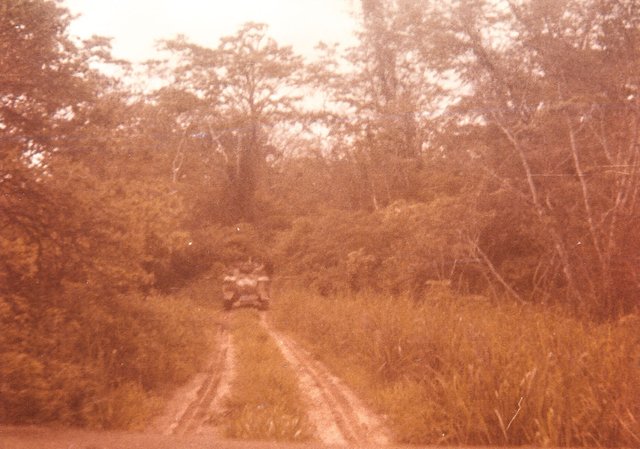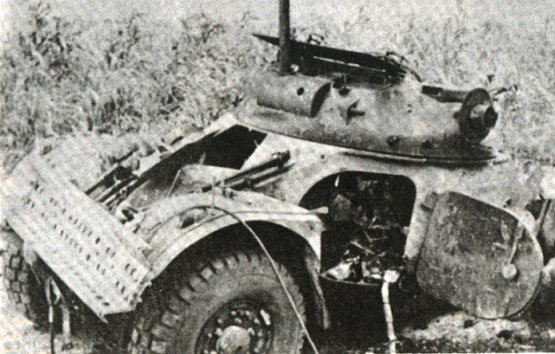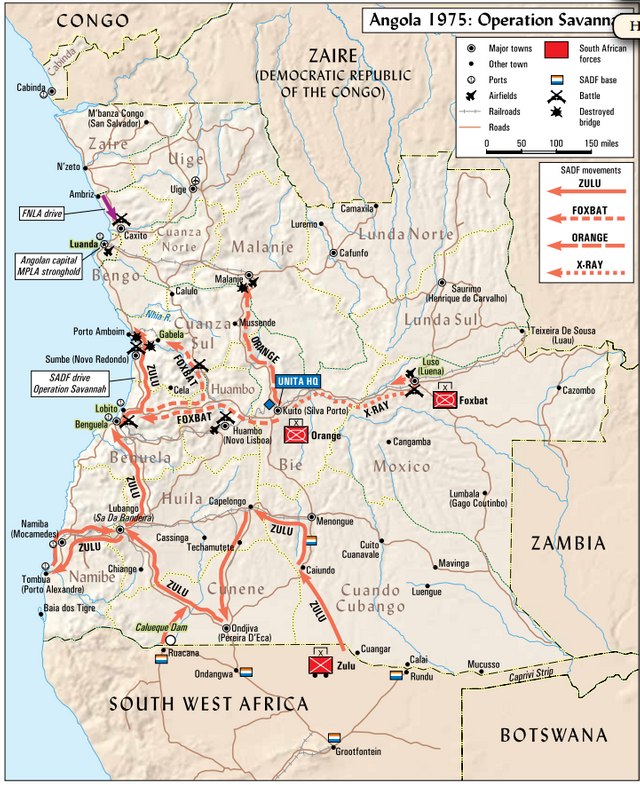The South African Border War - Operation Savannah - Battle of Ebo
After the massive defeat of the FNLA at the hands of the new Cuban Special forces it would be the South Africans that would come unstuck next.
By mid November just after independence day the Retreating MPLA had adopted the approach of holding positions at destroyed bridges.
One thing about Angola is that it has huge rivers and plenty rain in the north.
Task force Zulu was stuck at destroyed bridges along the coast and could not progress any further.

Trying to find an alternative route over the Keve River after the bridges were blown. This road east of Novo Redondo took us via mountain tracks through dense rain forests. Circa 17 to 19 November 1975.
source
The going was rough once the main tarred roads were left behind to find alternatives as shown above.
It was up to Foxbat to get to Luanda but they had also had blown up bridges to contend with. One such bridge was "bridge 14" and it was heavily defended.
With no easy prospect of crossing the river there Foxbat sought another route to the northwest via the town of Ebo.
After proceeding through Ebo and finding deserted MPLA defensive positions the column was spotted by an aircraft.
The battle group leadership on the ground called for a change of route since their path ahead would be able to be clearly calculated from where they were spotted.
Head Quarters refused and ordered them to proceed with all possible haste.
The rain was torrential at times and the armored vehicles and trucks were getting bogged down on the dirt track with progress being exceptionally slow.
Urgency from HQ was increasing and they were ordered to press forward and cross the next river by 1pm on the 25th November in spite of the difficulties that were being experienced.
The next river was less of a river, but more of a stream, nonetheless it had steep embankments on both sides making it a reasonable obstacle.
The terrain was such that the column of advancing vehicles had to stick to the roads. They were slippery and muddy but next to the roads were agricultural fields where the vehicles had to be dug out if they ventured in.
In the mean time, due to the delays in progress, the Cuban Special forces and the MPLA had prepared a massive ambush at the obstacle. The surrounds were perfect for it and they had had plenty of time to prepare due to the delays the advancing column were experiencing.
They had brought in a 76mm field gun, a BM-21 battery and anti-tank units armed with RPG-7s.

As an aside, I have handled this weapon and it was reputed to be the loudest bang you could make with a hand held device... at least among the things we came in contact with.
The advance of the teenagers in "Noddy" Eland armored cars was brought to an abrupt halt by the well executed Cuban special forces ambush. the advance quickly turned into a rescue effort that lasted most of the rest of the day.
Eventually 5 to 7 (account vary) armored cars were knocked out either by the long range artillery or the close range anti tank RPG's
5 SA soldiers were dead with 11 wounded. This was the first tangible South African defeat of Operation Savannah.
above numbers from Wikipedia but if you go to pro-Soviet records the numbers are vary significantly.

The South-Africans and counter revolutionary UNITA rebels suffered massive losses thanks the difficult ground for their armoured vehicles.
6 South African Eland armoured vehicles were destroyed and 1 was captured intact. The enemy suffered a combined loss of 76 dead, even if the S.A. propaganda admitted only 4 dead and 50 UNITA dead, another source admitted a number of 30 dead and 40 wounded between the S.A.
Also a little Recce aircraft Bosbok was shot down, with two SA pilots dead. Cuban sources estimated the enemy losses between 80 and 90 killed, close to the admitted mixed S.A. – UNITA losses
During the battle only one Cuban soldier was killed (named Juan Tamayo Castro) and other 5 were wounded.
source

The site of the battle as it appears on Google Earth today.
This loss effectively halted the Operation Savannah Advance and Ebo would be the furthest northwards the South African conventional forces would ever get in Angolan Territory for the remainder of the Border War.
It was an unnecessary loss brought about by generals and politicians, perhaps giddy with the rapid advances that Zulu had been making, ignoring the cautions from leaders on the ground.
Other posts in this series
The piece of the cold war nobody told you about - Africa's forgotten war
The Air Battles
The SA Fighter Aircraft
The SA Bomber Aircraft
The conflicts deep roots and start
Regional Tensions
Africa's forgotten cold war - Angolan War of Independence.
Africa's forgotten cold war - Mozambican War of Independence.
Africa's forgotten cold war - Rhodesian Bush War
Africa's forgotten cold war - The Angolan War of Independence transitions to the Angolan Civil War
The South African Border War - The start of Operation Savannah and Large scale South African involvement.
The South African Border War - Operation Savannah - the wheels start coming off.
The South African Border War - Operation Savannah - Battle of Quifangondo

Thank you for sharing.
Another very interesting story. You write as if you have had a fair share of military experience. Back during the days of these wars, not many families didn't have their teenage boys conscripted straight out of high school and into the army or air force. These wars left a big scar in the hearts and minds of many servicemen and their families.
An iteresting read on a topic we all love to hate, or hate to love.
This sounds truely scary, how did it feel to hold such a devastating device?
at the time, it was fun... but then I was still a teenager and liked things that go boom
About the generals and politicians ignoring the commander's advice on the combat field, which ended in defeat, it was very interesting. Arrogance boss.
Usually a war that should be won, but lost, is caused by it, by the politicians' egos.
Thank you for sharing the war story.
That's the danger of letting politicians & a general staff (far removed from the fighting & unfamiliar with tactics) make battlefield decisions.
things changed after that
Honest question, since that entire conflict isn't even discussed here, did it change for the better or the worse?
Did SA realize being a proxy for the US wasn't such a sweet deal after all?
This is fascinating. I never really understood the scope of the South African border war, despite it being one of the reasons my family left SA in the late 70's.
I look forward to reading more.
One brutal battle, a tank seems to be not a safe haven when an RPG gets to hit it on a vulnerable spot. The frontliners once again reap the price of hell they are drawn into in that african land.
Being European (Dutch), African or South African history isn't something our educational system focuses on. A lot of your posts contains information that is quite new to me. I'm very interested in these to educate myself further on this subject! Thanks for the time and effort you put into this, will be following you to stay updated.
Hey, with all the recent fighting over there, are there still a lot of active mine fields? Or dud rounds laying around?
you guessed it...
thank you once again @gavvet for this excellent historical narrative...Wars are not good...does not benefit anyone on the long run...however, historical narratives are very vital since for us to secure the future we must look into our past....see the mistakes we made so as to correct them. Your diction is quite excellent making this reader to be held bound till the last lines...you did very well...at a time i thought i was watching the classic "Battle of the Bulge & the bridge too far"!
Am curious on this part where you pointed out and i quote
"As an aside, I have handled this weapon and it was reputed to be the loudest bang you could make with a hand held device..."
My question therefore are
thanks once more for ticking my fancy..
keep it steeming hot!
Thanks for the clarification. You doing great. Guess you are a retired General...;) turn steemit General! Keep it steeming hot mate...